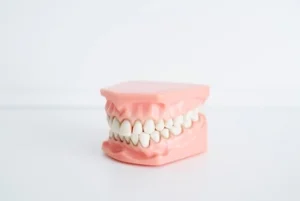When you first start wearing dentures, it can feel like your mouth is learning a new language. Every word, bite, and movement suddenly feels different. You might wonder if the lower ones are supposed to move more than the upper dentures or why they sometimes lift when you chew. So, how should lower dentures fit? That curiosity is completely normal. Lower dentures rely on a balance of muscle control, gum shape, and precision fitting rather than suction. Understanding how they should fit helps you feel more confident and comfortable each day.
What Determines A Proper Lower Denture Fit
Lower dentures have their own rules when it comes to stability. Knowing what shapes a good fit helps you understand why some dentures feel more secure and others may need adjustments from your prosthetist. Lower dentures may be designed as full dentures, immediate dentures, or new dentures depending on your treatment stage. Each type requires precise fitting to ensure long-term comfort and proper function in daily life.
 Why Lower Dentures Need Different Support Than Upper Ones
Why Lower Dentures Need Different Support Than Upper Ones
Unlike upper dentures, lower dentures don’t rest against a hard palate for suction. Instead, they sit on the gums and depend on muscle coordination, tongue balance, and the jaw’s natural contours to stay in place. This means that even a well-fitting denture may feel strange initially as your mouth adapts. The lower jaw moves constantly while speaking and chewing, which challenges the denture’s stability. That’s why getting fitted dentures that match your mouth’s unique shape is essential for long-term comfort and oral health.
How Gum Shape, Saliva Flow, And Tongue Movement Affect Stability
The way your gums and jawbone are shaped determines how dentures fit securely. When bone loss occurs, the ridge becomes flatter, reducing retention and increasing the chance of movement. Saliva also matters; too little and dentures can rub; too much and they may slip. Your tongue plays a surprisingly large role too, acting like a stabiliser that keeps dentures centred during chewing and speech. A trained prosthetist studies these details closely before making simple adjustments that help your dentures fit better.
The Role Of Bite Alignment And Bone Structure In Daily Comfort
Every time you close your mouth, your teeth and jawbone interact in ways that influence comfort and performance. If your bite isn’t aligned correctly, you may feel discomfort or even sore spots along your gums. Bone resorption, the gradual thinning of the jawbone after tooth loss, can also make dentures less stable. Preventing this starts with dentures that fit properly and regular follow-ups to check alignment. Balanced pressure across the mouth prevents irritation and keeps chewing smooth and comfortable.
How Your Prosthetist Ensures Balanced Fit And Function
A good fit doesn’t happen by chance; it’s carefully engineered. Your prosthetist will measure the contours of your gums, check jaw movement, and determine how the dentures interact with remaining natural teeth, if any. The process may involve adding new material to improve the seal or rebalancing areas that shift during speech. These small refinements ensure your dentures fit securely, giving you confidence when smiling, chewing, or reading aloud. When done correctly, lower dentures become a natural extension of your mouth rather than a foreign object.
Keeping Lower Dentures Secure, Comfortable, And Preventing Poorly Fitting Dentures
Even well-fitting dentures can change over time as your mouth naturally adapts. Ongoing denture care, timely adjustments, and awareness of fit changes help you maintain lasting comfort.
Early Signs Your Lower Dentures May Not Fit Correctly
A common side effect of poorly fitting dentures is soreness that develops after meals or extended wear. You might notice slipping when chewing or that food particles collect underneath the base. Ill-fitting dentures can also cause small sore spots or uneven pressure across the gums. When left untreated, this friction leads to inflammation or infection. Visiting your denture clinic at the first sign of discomfort ensures small issues don’t progress into more serious problems affecting oral health or self-esteem.
How Relining And Adjustments Help Restore Stability
Over time, your gums and bone can change shape, leading to loose-fitting dentures. A reline involves adding new material inside the denture base to match your mouth’s current contours. This process restores a comfortable fit and reduces movement. Regular adjustments keep existing dentures in good condition and prevent them from causing irritation or pain. Relining is a simple way to make your dentures fit like new without needing a full replacement, keeping your daily routine stress-free and your smile stable.
Using Denture Adhesives Safely For Temporary Support
If your dentures occasionally feel loose, using a denture adhesive can provide temporary stability. However, adhesives should not replace professional relining or fitting appointments. A small amount can help improve comfort when eating or speaking, but the dentures must be cleaned thoroughly at night using a cleaning solution. This prevents residue build-up and keeps your dentures hygienic. If you notice you’re using adhesive more often, it’s time to have your prosthetist review your dentures and make the necessary adjustments.
 Daily Care Habits That Maintain Fit, Hygiene, And Confidence
Daily Care Habits That Maintain Fit, Hygiene, And Confidence
Consistent denture care protects both your dentures and gums. Rinse them after meals to remove food particles, then soak them according to the manufacturer’s instructions. Allowing them to air dry overnight keeps bacteria from growing and ensures a fresh start each morning. Clean your dentures daily with a soft brush and mild soap, never harsh toothpaste, to prevent scratches. Keeping your mouth and dentures clean reduces gum disease risk and maintains a comfortable fit. Proper care also extends the lifespan of complete dentures, partial dentures, and implant-retained dentures.
Achieving Stability And Comfort With Lower and Implant-Retained Dentures
A comfortable fit is the foundation of wearing dentures confidently. Lower dentures that fit securely support chewing, speaking, and smiling without discomfort. If your dentures feel loose or cause irritation, your prosthetist can make simple adjustments or reline them for improved comfort. Long-term comfort depends on ongoing reviews, correct maintenance, and awareness of changes in your mouth and jaw. With the right attention, your dentures can stay secure and part of your everyday life. To discuss how we can help make your dentures fit properly and comfortably, contact our denture clinic today at (07) 5317 1023 or (07) 5315 8076 to schedule your visit.
References
https://my.clevelandclinic.org/health/treatments/10900-dentures
https://www.mayoclinic.org/healthy-lifestyle/healthy-aging/expert-answers/denture-care/faq-20058375


 Why Lower Dentures Need Different Support Than Upper Ones
Why Lower Dentures Need Different Support Than Upper Ones Daily Care Habits That Maintain Fit, Hygiene, And Confidence
Daily Care Habits That Maintain Fit, Hygiene, And Confidence

Recent Comments